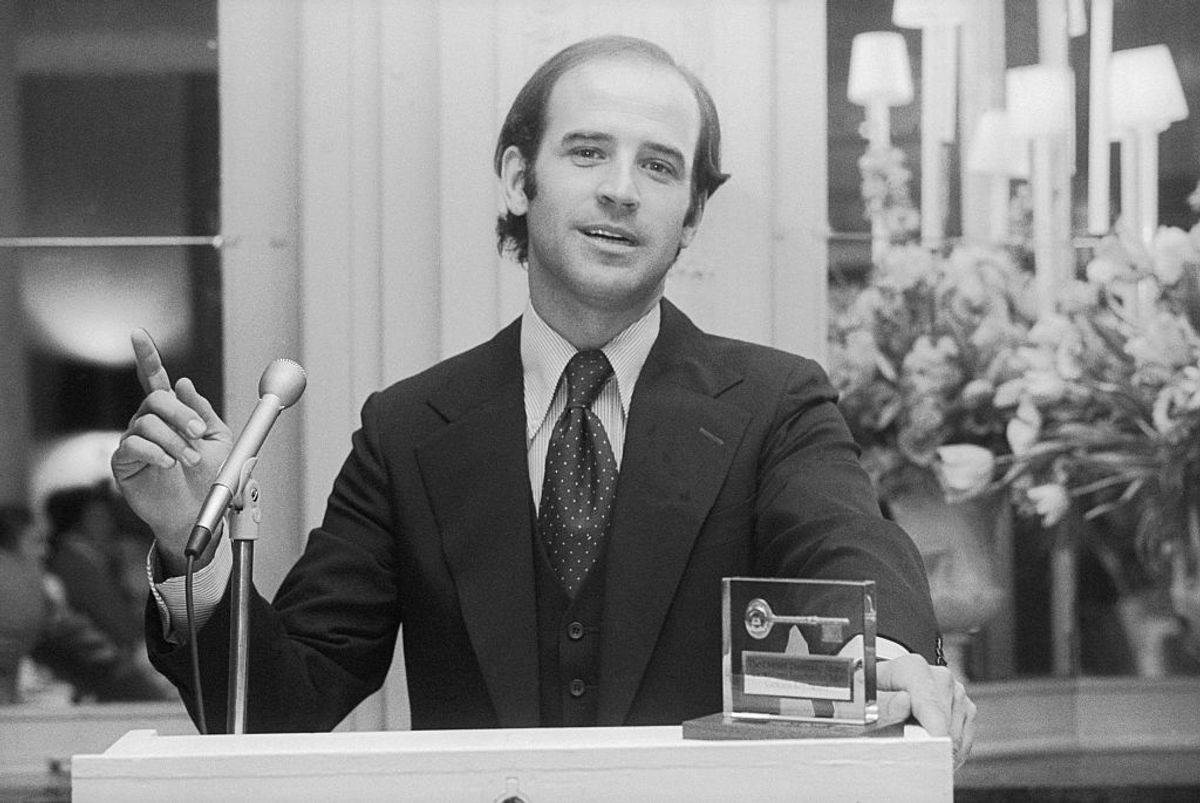Biden was criticizing the electioneering system that pushed politicians into raising a lot of money from big donors and called for campaign finance reform.
In July and October 2023, a video clip of U.S. President Joe Biden from earlier in his political career went viral, in which he spoke of having been ready to “prostitute” himself to raise money for an election campaign. The video, which consisted of excerpts from a 1974 episode of "The Advocates," a television show in which public figures debated issues of the day, was shared by the conservative think tank Heritage Foundation on X (formerly Twitter), for example.
The post highlighted key sections of Biden’s responses to questions surrounding campaign finance reform, including comments like, “I'm not sure you should assume I'm not corrupt ...” and, “I went to the big guys for the money. I was ready to prostitute myself in the manner in which I talk about it.”
Other posts on X also highlighted Biden's statements from this specific section of the discussion, providing little or no context:
Biden did indeed make the above statement, but as the context makes clear, he did so as a criticism of a campaign finance system in which politicians like himself are required to raise vast amounts of money to run for high office. The full debate can be found on WGBH radio’s website.
Specifically, Biden was describing the challenges he faced fundraising for his U.S. Senate campaign as a young candidate. His statements and the preceding questions posed by Tom Bordeaux, another politician, are reproduced below (emphasis ours):
Bordeaux: And I believe that you just said that your campaign cost some $300,000.
Biden: $276,000.
Bourdeaux: All right, sir, and you raised that money by public contributions, did you not?
Biden: That's correct.
Bourdeaux: And you raised that money in a race against an incumbent, did you not?
Biden: That's correct.
Bourdeaux: Yes, and Senator, I'm sure that you would agree that your service in the Senate up to this point has not reflected any particular concern for the larger contributors.
Biden: Well, the fortunate thing is that I didn't have many larger contributors and the only reason … See, I went to the big guys for the money. I was ready to prostitute myself in the manner in which I talk about it, but what happened was they said, "Come back when you're forty, son." And so I had to go out . . . so I had to go to a number of small contributors.
Biden was speaking about the need for campaign finance reform. Earlier in the interview, responding to a question from the moderator, who asked why the system produces corruption, Biden said that corruption was "implicit" in the campaign fundraising system. That's also when he introduced the metaphor of candidates “prostituting” themselves to raise money from big donors. That exchange is reproduced below (emphasis ours):
Lowenstein: Senator Biden, it's nice to have you here, as the youngest member of the Senate, the one, therefore, who may expect the longest career there. I wonder if you'd say to us, since it's clear you're not corrupt, and you got elected, why should people think that the system produces corrupt results when there you are?
Biden: Well, I'm not sure you should assume I'm not corrupt, but I thank you for that. The system does produce corruption—I think implicit in the system is corruption. In fact, whether or not you can run for public office—and it costs a great deal of money to run for the United States Senate, even for a small state like Delaware—you have to go to those people who have money. They always want something.
Lowenstein: Well, I wonder whether you would feel that there's some virtue in forcing candidates to go out and try to raise money. I've heard people—probably people who didn't run for office—say that it's uplifting to go out and try to get money. Do you think that there's something un-uplifting about putting a limit to how much you can ask one man to give you?
Biden: I think it's the most degrading experience in the world to have to go out and ask for money because you know that unless you accidentally agree with the position taken by the person or group that has the money, that you run the risk of deciding whether or not you're going to prostitute yourself to give the answer you know they want to hear in order to get funded to run for that office. And it's coincidental in many instances when in fact you happen to agree with where they are, and you run the risk, by the way, of rationalizing, of saying, "Well, if I compromise on this one—give them one—I get ninety percent of what I want, and I don't have to give in too much."
Given that Biden did indeed say "I was ready to prostitute myself in the manner in which I talk about it," albeit using his own experience as an example of what's wrong with the existing campaign financing system, we rate this claim as a “Correct Attribution.”

